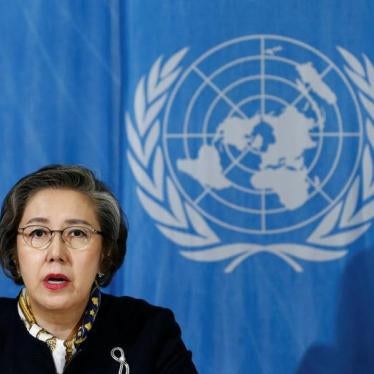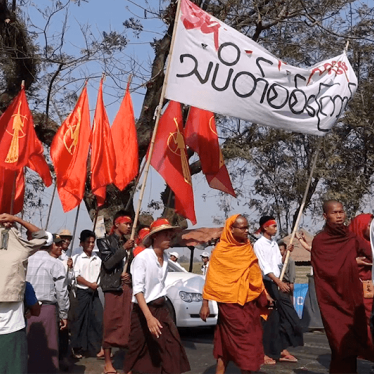Donald Tusk
President of the European Council
Rue de la Loi/Wetstraat 175
1048 Brussels
Federica Mogherini
High Representative of the Union for Foreign Affairs and Security Policy /
Vice-President of the European Commission
Rue de la Loi / Wetstraat 200
1049 Brussels
Brussels, 27 April 2017
Re: Aung San Suu Kyi’s visit and human rights in Burma
Dear President Tusk and High Representative / Vice-President Mogherini
We write to you to express our deep concern about ongoing and serious human rights abuses in Burma and to urge you to address these issues during the upcoming visit by State Counsellor and Foreign Minister Daw Aung San Suu Kyi.
Our core concerns include: ensuring the Burmese government’s full cooperation with the Human Rights Council-mandated independent international fact-finding mission into recent human rights violations in the country; the serious human rights crisis faced by ethnic Rohingya Muslims in Rakhine State; international human rights and humanitarian law violations in Kachin and Shan States; and increasing numbers of political prisoners and continued restrictions on the right to freedom of expression and peaceful assembly, including as a result of the prosecution of peaceful protesters and critics of the government.
UN Mandated Fact-Finding Mission
The successful operation of the Fact-Finding Mission established, through a European Union (EU)-sponsored resolution, adopted by the United Nations Human Rights Council in March 2017 is critical to documenting abuses committed by Burmese security forces, creating accountability for these abuses, and preventing future abuses, particularly against the Rohingya. We urge you to press Aung San Suu Kyi, her government, and the Burmese military to fully cooperate with that mission.
The Fact-Finding Mission will be crucial to establishing the facts in Rakhine State following the October 9, 2016 attacks on three border guard posts in northern Rakhine State by militants from the Arakan Rohingya Salvation Army (ARSA). The United Nations, Human Rights Watch and other human rights organizations, and the media have reported that government security forces inflicted widespread and serious abuses against Rohingya civilians throughout northern Rakhine State in the wake of those attacks. Human Rights Watch has documented burnings of numerous Rohingya villages, extrajudicial killings, and systematic rape and other sexual violence. Untold numbers were killed in the several months-long “clearance operations” and, at its peak, more than 90,000 were displaced, over 70,000 of whom fled to Bangladesh. The UN Office of the High Commissioner for Human Rights released a report in February 2017 that concluded it was very likely that Burmese security forces committed crimes against humanity during those operations. Investigations by the Burmese government’s various domestic commissions have not been credible or impartial.
Full cooperation with the Fact-Finding Mission will indicate the Burmese government’s commitment to upholding the rule of law and to identifying and holding to account those responsible for abuses. It will also send a clear message to potential perpetrators of rights abuses in the future.
While the EU-sponsored resolution was adopted by consensus by the members of the Human Rights Council, the Burmese government has publicly disassociated itself from the resolution. However, it has not said it will not cooperate or allow access.
In addition to encouraging full cooperation with the Fact-Finding Mission, we urge you to call upon the Burmese authorities to immediately remove all restrictions on the provision of humanitarian aid in Rakhine State, including allowing for organizations to complete comprehensive humanitarian assessments. We also urge you to press the authorities to allow unfettered access to all parts of Rakhine State to independent human rights monitors and journalists.
Discriminatory Treatment of the Rohingya Population
Beyond the recent violence in northern Rakhine State, the Rohingya population has long faced systematic discrimination and denial of their human rights. We urge you to press the government to: (1) amend the discriminatory provisions of the 1982 Citizenship Law that effectively deny Rohingya citizenship and bring the law into line with international human rights standards; (2) end restrictions on freedom of movement that severely impact the Rohingya’s rights to health and livelihood in Rakhine State; (3) provide universal, non-discriminatory access to education; and (4) facilitate the safe and voluntary return of the 120,000 Rohingya who have been internally displaced since the June and October 2012 violence that Human Rights Watch research showed amounted to “ethnic cleansing” and crimes against humanity. Furthermore, while the government recently indicated its intention to close three camps for internally displaced persons (IDPs) in Rakhine State, it has not yet indicated when or how it will do this. We urge you to encourage the government to ensure that all IDP camp closures are done with a view of protecting the human rights of the displaced and allowing the residents to freely decide whether to return to their original homes, with appropriate compensation and protection.
Abuses in Kachin and Shan States
Renewed fighting between the military and ethnic armed groups in Kachin and Shan States has imperiled civilians through human rights abuses allegedly committed by government forces and ethnic armed groups, successive instances of displacement, and the blockage of humanitarian assistance by the government. We urge you to press the government and military to adhere to international human rights and humanitarian law in Kachin and Shan States.
Violations of Freedom of Expression and Peaceful Assembly
Despite the significant improvements since 2011 in respect for freedom of expression in Burma, many repressive laws remain in effect. Large numbers of individuals continue to be jailed and prosecuted for peaceful speech and assembly. We urge you to press the government to: release all political prisoners; end the use of criminal laws, such as section 66(d) of the Telecommunications Act and sections 141-147 and 505 of the Penal Code, to penalize peaceful speech and assembly; and to repeal or amend other laws, as identified in Human Rights Watch’s 2016 report, to bring them into full compliance with international standards for the protection of the rights to freedom of expression, association, and peaceful assembly, and other fundamental rights.
We believe it is important to communicate to Aung San Suu Kyi that embracing the recommendations in the recent Human Rights Council resolution, including the Fact-Finding Mission. and taking steps to hold the military accountable for its actions would further her stated goals of amending the constitution to bring the military under civilian control, end the military’s right to dissolve the government, and remove the military’s power to appoint the ministers of defense, home affairs and border affairs. It is untenable for the elected civilian government to preside over key ministers who do not report to the civilian leadership. She should recognize that while the military is implicated in most of the abuses outlined above, unless the civilian government takes all possible steps to address and prevent them it will still bear considerable responsibility. It is very worrying that the Office of the State Counsellor and the Ministry of Foreign Affairs have repeatedly denied well-documented reports of extrajudicial killings, sexual violence and destruction of Rohingya villages, giving the impression of indifference or antipathy to a persecuted minority.
While Burma has made significant progress toward becoming a rights-respecting state, it is now at a critical juncture. Aung San Suu Kyi, as the de facto leader of the government, should urgently act to ensure that the human rights of all its people are respected and protected. Key donors like the EU, which are working to assist Burma’s political and economic development, should make it clear to Aung San Suu Kyi during her visit that the political transition away from military dictatorship and the country’s continued economic development will only succeed when human rights are respected. This should include offering the EU’s firm support if she takes the necessary and overdue steps to confront the behavior and role of the military.
Thank you for your consideration. Please do not hesitate to contact us for any further information you may wish.
Sincerely,
Lotte Leicht Brad Adams
EU Director Executive Director, Asia Division
Human Rights Watch Human Rights Watch








